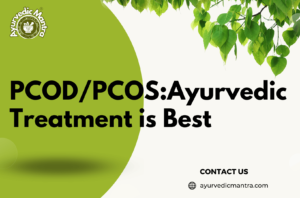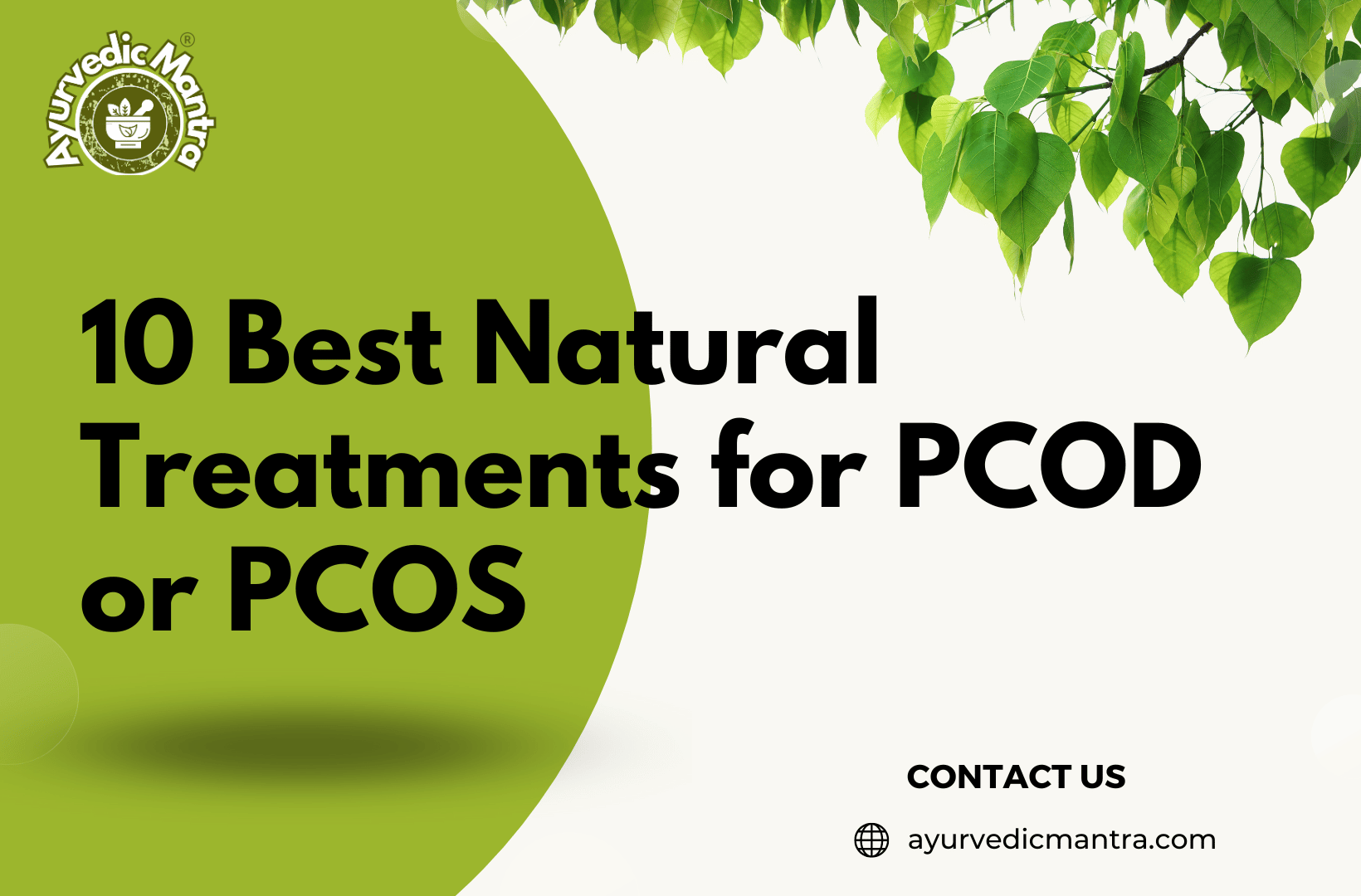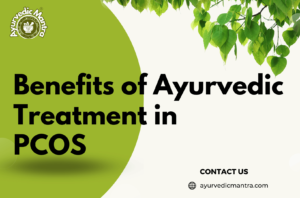
PCOD/PCOS: Ayurvedic Treatment is Best
Introduction Polycystic Ovary Disorder (PCOD) or Polycystic Ovary Syndrome (PCOS) is a common endocrine disorder affecting millions of women worldwide. It leads to hormonal imbalances,

Polycystic Ovary Syndrome (PCOS), also known as Polycystic Ovary Disorder (PCOD), is a common hormonal disorder that affects many women of reproductive age. Characterized by irregular periods, hormonal imbalances, and cysts on the ovaries, PCOS can lead to various health complications, including infertility, insulin resistance, and metabolic disorders. While medical interventions are available, many individuals seek natural treatments to manage their symptoms and promote overall well-being. This article will explore the 10 best natural remedies for PCOD/PCOS that can help alleviate symptoms and support hormonal balance.
Adopting a balanced and nutrient-rich diet can play a significant role in managing PCOD/PCOS. Focus on whole foods such as fruits, vegetables, lean proteins, whole grains, and healthy fats. Incorporating high-fiber foods can help regulate blood sugar levels and improve insulin sensitivity, crucial for managing PCOS-related insulin resistance.
Regular physical activity has numerous benefits for women with PCOD/PCOS. Exercise helps improve insulin sensitivity, aids in weight management, and promotes overall hormonal balance. Activities like cardio, strength training, and yoga can be particularly beneficial.
Chronic stress can exacerbate PCOS symptoms by impacting hormone levels. Stress-reduction techniques such as meditation, deep breathing, and mindfulness can help regulate hormones and improve overall well-being.
Several herbal supplements, such as cinnamon, spearmint tea, and fenugreek, have shown potential in managing PCOS symptoms. These herbs may help regulate menstrual cycles, reduce androgen levels, and improve insulin sensitivity.
Cinnamon has been shown to improve insulin sensitivity and regulate menstrual cycles in women with PCOS. Adding cinnamon to your diet or supplement may help manage blood sugar levels and hormone imbalances.
Spearmint tea has anti-androgenic properties and may help reduce excess facial and body hair growth associated with PCOS. Drinking spearmint tea regularly can have a positive impact on hormone levels.
Fenugreek seeds can help lower blood sugar levels and improve insulin resistance. They may also aid in regulating menstrual cycles and promoting ovulation in women with PCOS.
Acupuncture is an alternative therapy that involves inserting thin needles into specific points of the body. Some studies suggest that acupuncture can help regulate menstrual cycles, reduce androgen levels, and improve fertility in women with PCOS.
Making positive lifestyle changes, such as getting adequate sleep, quitting smoking, and limiting alcohol intake, can improve PCOS management. These changes can help regulate hormone levels and improve overall health.
Chromium is a mineral that plays a role in insulin regulation. Research indicates chromium supplements may improve insulin sensitivity and glucose tolerance in women with PCOS.
While there is no one-size-fits-all approach to managing PCOD/PCOS, incorporating these natural treatments into your lifestyle can positively impact symptom management and overall well-being. It’s essential to consult with a healthcare professional before making significant changes to your diet, exercise routine, or supplement regimen, especially if you have underlying medical conditions. By adopting a holistic approach that combines dietary modifications, exercise, stress management, and targeted supplements, women with PCOD/PCOS can take proactive steps towards better health and hormonal balance.
Frequently Asked Questions (FAQs) about PCOD/PCOS and Natural Treatments
PCOD (Polycystic Ovary Disorder) or PCOS (Polycystic Ovary Syndrome) is a hormonal disorder that affects the ovaries and can lead to irregular menstrual cycles, hormonal imbalances, and the development of small cysts on the ovaries. Common symptoms include irregular periods, excessive hair growth, acne, weight gain, and fertility issues.
Diet plays a crucial role in managing PCOD/PCOS. A balanced diet rich in whole foods, including fruits, vegetables, lean proteins, whole grains, and healthy fats, can help regulate insulin levels, improve insulin sensitivity, and manage weight. High-fiber foods also aid in maintaining stable blood sugar levels, essential for PCOS management.
Yes, regular exercise can benefit individuals with PCOD/PCOS. Physical activity helps improve insulin sensitivity, manage weight, and promote hormonal balance. Cardiovascular conditioning, strength training, and yoga have been shown to affect PCOS symptoms positively.
Chronic stress can worsen PCOD/PCOS symptoms by affecting hormone levels, particularly cortisol and insulin. Stress reduction techniques such as meditation, deep breathing, and mindfulness can help regulate these hormones and improve overall well-being.
Some herbal supplements have shown promise in managing PCOD/PCOS symptoms. Cinnamon is known for its potential to improve insulin sensitivity and regulate menstrual cycles. Spearmint tea possesses anti-androgenic properties that may reduce excess hair growth. Fenugreek can help lower blood sugar levels and improve insulin resistance.
Acupuncture, an alternative therapy, has been studied for its potential benefits in managing PCOD/PCOS. Research suggests that acupuncture may help regulate menstrual cycles, lower androgen levels, and enhance fertility in affected women. However, individual responses can vary.
Positive lifestyle changes, such as getting sufficient sleep, quitting smoking, and limiting alcohol consumption, can improve PCOD/PCOS management. Adequate sleep supports hormone regulation, and avoiding harmful habits can help improve overall hormonal balance.
Chromium is a mineral that may improve insulin sensitivity and glucose tolerance. Some studies suggest chromium supplements can benefit women with PCOD/PCOS by aiding insulin regulation. However, consultation with a healthcare professional is advised before starting any new supplement regimen.
Natural treatments can help manage PCOD/PCOS symptoms and improve overall well-being, but they may not provide a complete cure. PCOD/PCOS is a complex hormonal disorder influenced by various factors, including genetics. While natural treatments can effectively manage symptoms, individual responses vary, and long-term management may be necessary.
It is essential to consult a healthcare professional before making significant changes to your diet, exercise routine, or supplement intake, especially if you have underlying health conditions. A healthcare provider can provide personalized guidance, ensure safe and effective treatment, and naturally monitor your progress in managing PCOD/PCOS.

Introduction Polycystic Ovary Disorder (PCOD) or Polycystic Ovary Syndrome (PCOS) is a common endocrine disorder affecting millions of women worldwide. It leads to hormonal imbalances,

Introduction Losing weight is a journey that requires dedication, consistency, and self-care. While there are numerous weight loss techniques out there, not all of them

Polycystic Ovary Syndrome (PCOS) is a hormonal disorder that affects millions of women worldwide. It can lead to various health complications, such as irregular periods,

In recent years, Ayurveda, an ancient system of natural healing originating from India, has gained significant popularity as an alternative approach to treating various health

आजकल वजन बढ़ने और चर्बी की वृद्धि होने की समस्या एक आम समस्या बन गई है। बढ़ते वजन और अतिरिक्त चर्बी के कारण न केवल

प्रस्तावना: आजकल वजन बढ़ने और ओबेसिटी की समस्या एक आम समस्या बन गई है। बढ़ते वजन के कारण न केवल शारीरिक समस्याएं होती हैं, बल्कि
